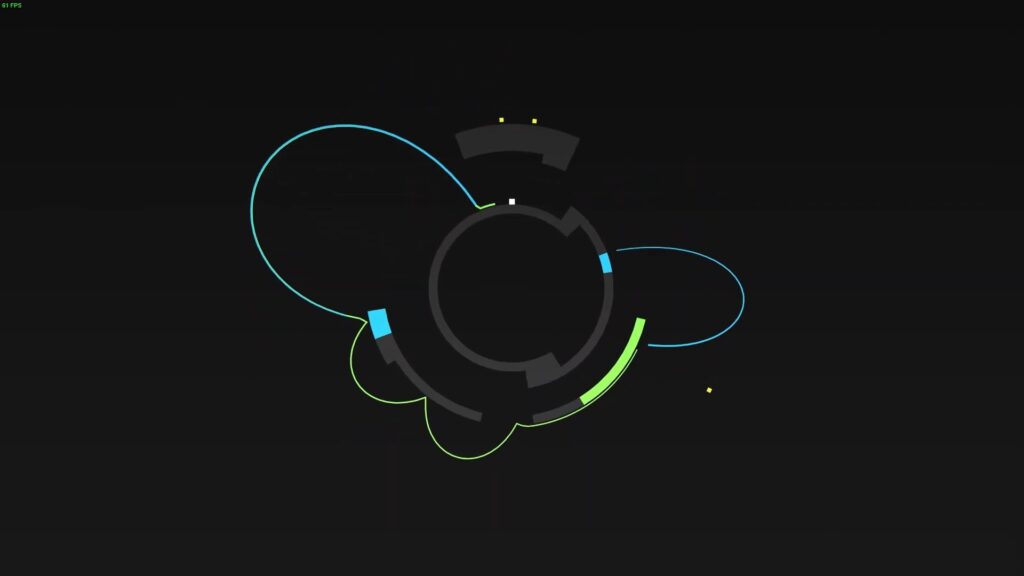
Developer: SPECTRUM48
Publisher: SPECTRUM48
Platform: PC, Android, iOS
Tested on: Switch
OCO – Review
After a critically acclaimed run on iOS and Android, SPECTRUM48’s rhythmic puzzle platformer OCO has arrived on Steam. With its sleek, minimalist style and simple gameplay, it certainly stands out from the crowd, but is this a game worth picking up or are you better off seeking your puzzle thrills elsewhere?
Story
There’s no story to be found here at all. In all honesty, we couldn’t think of a narrative that ties things together here, and the game doesn’t suffer from the absence of a story.
Graphics
With no interface visible during the levels and only the required bare minimum when it comes to visuals, OCO goes for a “less is more” approach. This means that it might not be the most graphically impressive game out there, but the minimalistic style gives OCO a slick and modern appearance, and we found ourselves entranced by how well the clean visuals tied everything together. That said, there is nothing to OCO’s visuals beyond what you see in the screenshots. If the visuals aren’t your cup of tea based on the still images, then seeing them in motion isn’t going to convince you either.
Sound
The game’s excellent soundtrack is intrinsically tied to the gameplay experience, and SPECTRUM48 recommends using headphones while playing OCO. We can only agree, as the futuristic beats not only lend credence to the overall minimalist approach, but they also serve as an aid in completing the levels. You see, while the basic rhythm is present, each of your own actions adds to the soundtrack, whether it’s a jump or picking up yellow squares. More on the latter in the gameplay section of this review, but rest assured that having a good sense of rhythm helps in successfully clearing stages. Knowing when a beat should hit equals knowing when to make a jump.
Gameplay
OCO combines platformer and puzzle gameplay to create a minimalist experience that rises above its concept. Levels are circular in shape and will rotate, with the player taking control of a small white square. Well, control is a big word, as the only ability the player has is to jump. This is done by simply clicking the mouse button. When doing so, you’ll jump, either to grab a yellow square, move up to a higher platform, or avoid an obstacle. If the white square bumps into a solid wall, the continuous rotation of the stage reverses its direction. The aim is to collect the yellow squares that are dotted around each of the 180 levels, which sounds much easier in theory than it does in practice. Not that OCO’s core gameplay isn’t incredibly simple, but the clever level designs make for a challenging affair, despite the short length of each stage.
Although you can clear stages at your own pace, taking as many times and jumps as you need, the game records the number of jumps and the time needed, encouraging you to go back to beat your own score. There is a set number of jumps and a specific time to “beat” if you want to get the perfect score, but for most people, this will take several tries. New elements are introduced with each of the game’s 10 worlds as well. Stage hazards, such as glowing orange areas that represent lava, and boosts, such as green areas that speed up the cube, are gradually introduced as well. These ensure that OCO doesn’t end up feeling repetitive, and keep players on their toes. Stages can typically be cleared in under a minute but if you’re a perfectionist, you’ll be spending quite some time replaying stages over and over again, trying to shave off a jump here and a second there.
You’re getting a decent amount of bang for your buck here, and with additional daily challenges, you’ll be able to spend quite a lot of time before you’ve seen everything. Rounding things out is the user-generated content. OCO may be a relatively new arrival on PC, but it’s been around as a mobile title for quite a few years now, resulting in over 75000 community-created stages. This only ensures the longevity of OCO. Naturally, you’re able to create and share your own stages as well. One downside specific to the PC version is that the simplistic nature and the daily challenge approach of the game make it feel far better suited for the pick-up-and-play style we’ve come to associate with mobile games rather than a full-fledged PC title. In this regard, we’re left wondering if OCO really needed a Steam release, as the game is probably best enjoyed a few minutes at a time during your daily commute or toilet break. OCO‘s other major flaw isn’t tied specifically to the PC version of the game though: the game is missing, for lack of a better word, a hook. There is no emotional component present, nor is there a real incentive for you to try and beat that high score. It’s clean, slick, polished and it’s a fantastic game that certainly delivers what it sets out to do. It’s clear that SPECTRUM48 tried to achieve perfection within the world they created for OCO, but by removing any flaws or imperfections, they created a game that is lacking soul, and ultimately, it feels bland within that perfection.
Conclusion
OCO delivers exactly what it says on the tin. While it lacks a story, the excellent soundtrack, tight gameplay, and simplistic visuals come together to create a result that is greater than the sum of its individual parts. However, there is nothing beneath the slick and minimalist surface; no motivation or incentive to keep playing, and nothing to hook the player in. Don’t get us wrong, there’s fun to be had with OCO, just don’t expect the game to color outside the lines and surprise you in any way possible.
OCO - Review,








No Comments